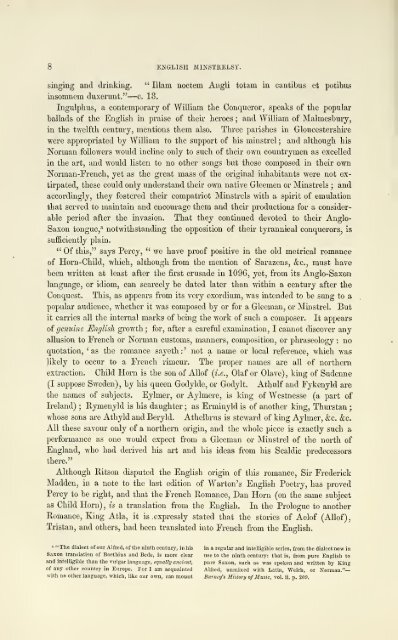Popular music of the olden time. A collection of ancient songs ...
Popular music of the olden time. A collection of ancient songs ...
Popular music of the olden time. A collection of ancient songs ...
You also want an ePaper? Increase the reach of your titles
YUMPU automatically turns print PDFs into web optimized ePapers that Google loves.
8 ENGLISH MINSTRELSY.<br />
singing and drinking. " Ulam noctem Angli totam in cantibus et potibus<br />
insomnem duxerunt."—c. 13.<br />
Ingulphus, a contemporary <strong>of</strong> William <strong>the</strong> Conqueror, speaks <strong>of</strong> <strong>the</strong> popular<br />
ballads <strong>of</strong> <strong>the</strong> English in praise <strong>of</strong> <strong>the</strong>u' heroes ; and William <strong>of</strong> Malmesbury,<br />
in <strong>the</strong> twelfth centui*y, mentions <strong>the</strong>m also. Three parishes in Gloucestershire<br />
were appropriated by William to <strong>the</strong> support <strong>of</strong> his minstrel ; and although his<br />
Norman followers would incline only to such <strong>of</strong> <strong>the</strong>ir own countrymen as excelled<br />
in <strong>the</strong> art, and would listen to no o<strong>the</strong>r <strong>songs</strong> but those composed in <strong>the</strong>ir own<br />
Norman-French, yet as<br />
<strong>the</strong> great mass <strong>of</strong> <strong>the</strong> original inhabitants were not extirpated,<br />
<strong>the</strong>se could only understand <strong>the</strong>ir own native Gleemen or Minstrels ;<br />
accordingly, <strong>the</strong>y fostered <strong>the</strong>ir compatriot Minsti-els with a spirit <strong>of</strong> emulation<br />
that served to maintain and encourage <strong>the</strong>m and <strong>the</strong>ir productions for a considerable<br />
period after <strong>the</strong> invasion. That <strong>the</strong>y continued devoted to <strong>the</strong>ir Anglo-<br />
Saxon tongue,'^ notwithstanding <strong>the</strong> opposition<br />
and<br />
<strong>of</strong> <strong>the</strong>ir tyrannical conquerors, is<br />
sufficiently plain.<br />
" Of this," says Percy, " we have pro<strong>of</strong> positive in <strong>the</strong> old metrical romance<br />
<strong>of</strong> Horn-Child, which, although from <strong>the</strong> mention <strong>of</strong> Sarazens, &c., must have<br />
been written at least after <strong>the</strong> first crusade in 1096, yet, from its Anglo-Saxon<br />
language, or idiom, can scarcely be dated later than within a century after <strong>the</strong><br />
Conquest. This, as appears fi'om its very exordium, was intended to be sung to a<br />
popular audience, whe<strong>the</strong>r it was composed by or for a Gleeman, or Minstrel. But<br />
it carries all <strong>the</strong> internal marks <strong>of</strong> bemg <strong>the</strong> work <strong>of</strong> such a composer.<br />
<strong>of</strong> genuine Miglish growth ;<br />
It appears<br />
for, after a careful examination, I cannot discover any<br />
allusion to French or Norman customs, manners, composition, or phraseology :<br />
quotation, ' as <strong>the</strong> romance sayeth : ' not a name or local reference, which was<br />
likely to occur to a French rimeur. The proper names are all <strong>of</strong> nor<strong>the</strong>rn<br />
extraction. Child Horn is <strong>the</strong> son <strong>of</strong> All<strong>of</strong> {i.e., Olaf or Olave), king <strong>of</strong> Sudenne<br />
(I suppose Sweden), by his queen Godylde, or Godylt. Athulf and Fykenyld are<br />
<strong>the</strong> names <strong>of</strong> subjects. Eylmer, or Aylmere, is king <strong>of</strong> Westnesse (a part <strong>of</strong><br />
Ii-eland) ; Rymenyld is his daughter ; as Erminyld is <strong>of</strong> ano<strong>the</strong>r king, Thurstan<br />
whose sons are Athyld and Beryld.<br />
A<strong>the</strong>lbrus is steward <strong>of</strong> king Aylmer, &c. &c.<br />
All <strong>the</strong>se savour only <strong>of</strong> a nor<strong>the</strong>rn origin, and <strong>the</strong> whole piece is<br />
no<br />
exactly such a<br />
performance as one would expect from a Gleeman or Minsti-el <strong>of</strong> <strong>the</strong> north <strong>of</strong><br />
England, who had derived his art and his ideas from his Scaldic predecessors<br />
<strong>the</strong>re."<br />
Although Ritson disputed <strong>the</strong> English origin <strong>of</strong> this romance. Sir Frederick<br />
Madden, in a note to <strong>the</strong> last edition <strong>of</strong> Warton's English Poetry, has proved<br />
Percy to be right, and that <strong>the</strong> French Romance, Dan Horn (on <strong>the</strong> same subject<br />
as Child Horn), is a translation from <strong>the</strong> English. In <strong>the</strong> Prologue to ano<strong>the</strong>r<br />
Romance, King Atla, it is expressly stated that <strong>the</strong> stories <strong>of</strong> Ael<strong>of</strong> (All<strong>of</strong>),<br />
Tristan, and o<strong>the</strong>rs, had been translated into French from <strong>the</strong> English.<br />
« "The dialect <strong>of</strong>our Alfred, <strong>of</strong> <strong>the</strong> ninth century, in his in a regular and intelligible series, from <strong>the</strong> dialect now in<br />
Saxon translation <strong>of</strong> Boethius and Bede, is more clear use to <strong>the</strong> ninth century: that is, from pure English to<br />
and intelligible than <strong>the</strong> vulgar language, f5KB%a7!deB(, pure Saxon, such as was spoken and written by King<br />
<strong>of</strong> any o<strong>the</strong>r country in Europe. For I am acquainted Alfred, unmixed with Latin, Welch, or Norman."—<br />
with no o<strong>the</strong>r language, which, like our own, can mount Burney's History <strong>of</strong> Music, vol. ii. p. 209.

















